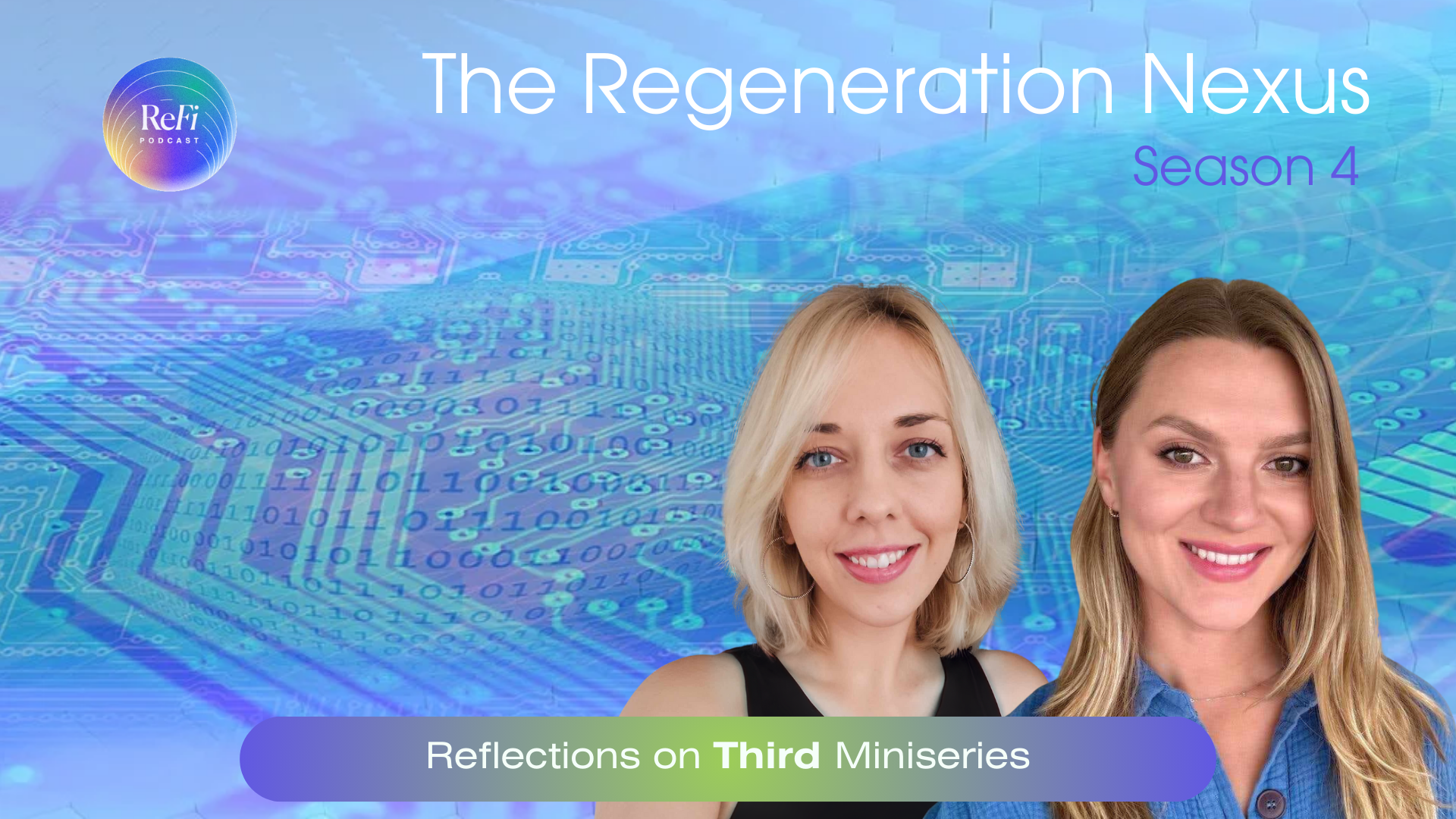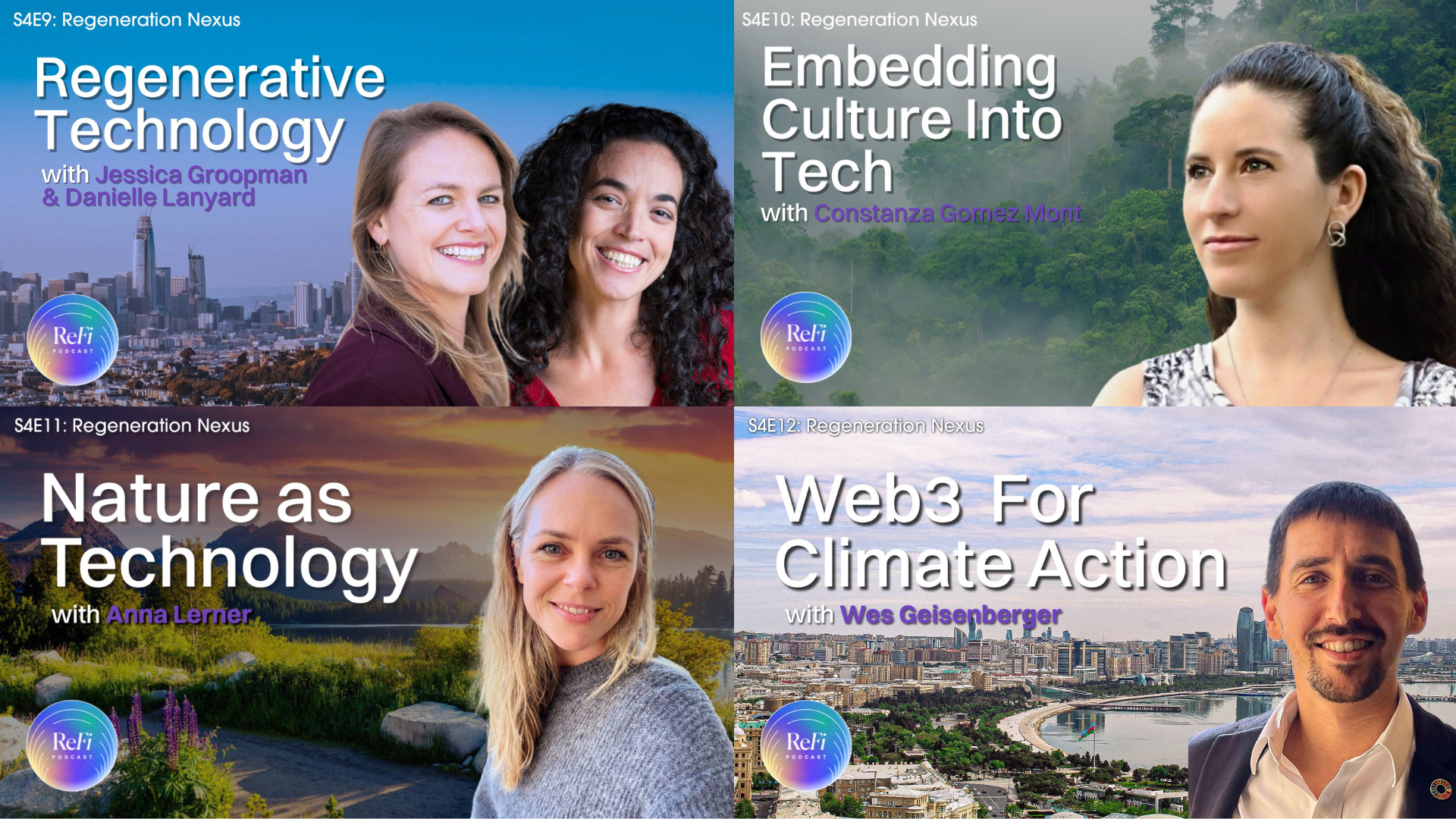Reflections on the Third ReFi Podcast S4 Miniseries: Tools to Scale Impact 🛠️🎙️

After taking a short break over the New Year, we’re back with reflections from the final miniseries of Season 4 on The Tools: How can technological advances enhance and scale regenerative vision?
This series explored how emerging technologies—from AI to blockchain—can support ecological restoration, empower communities, and shift financial systems toward regeneration. But a key theme emerged across the conversations: Technology alone won’t save us. The way we design and implement these tools matters just as much as the tools themselves. 🙌
Through conversations with Jessica Groopman & Danielle Lanyard, Constanza Gomez Mont, Anna Lerner, and Wes Geisenberger, we explored the tension between innovation and extraction, the risks of financializing nature, and the role of trust and collaboration in making technology work for regeneration.
Even though Season 4 has wrapped up, we’re not done yet—we have two special bonus episodes on the way and are already brainstorming for Season 5. In the meantime, we’d love your support!
And now, let's dive into our learnings... 👇

💡 Key Themes
⚖️ Technology Reflects Our Morality
For too long, technological progress has been treated as inevitable. But progress toward what—and at what cost? Jessica Groopman and Danielle Lanyard challenge the dominant narrative that technology is inherently good, emphasizing that it always reflects the values embedded within it.
Jessica reframes technology not as just digital tools, but as “the structuring of flows of materials, energy, and information to adapt and thrive.” The real question, then, is: Are we designing these flows to regenerate life—or to extract from it? The answer hinges on the moral and ethical choices of those who create and deploy technology.

Danielle, drawing from deep ecology and alternative economies, highlights that regenerative technology isn’t about efficiency—it’s about relationships, interdependence, and care. Mindfulness, she argues, is not just a personal practice; it’s an essential design principle. When we cultivate awareness, we resist the impulse to extract, optimize, and control—and instead create technology that nurtures and sustains.
“I often say that my most important skill as a tech builder is my meditation practice because I know when to step away from the machine when things are not going right and just take a breath and go for a walk.” – Danielle Lanyard
Tune into Jessica's & Danielle's Episode. 👇
🧠 Technology Serves, Not Replaces, Human Knowledge
In her work leading an AI-driven jaguar conservation project, Constanza Gomez Mont found that technology alone wasn’t enough. AI could map out jaguar populations and monitor movement patterns, but it was the local communities who understood what those patterns meant, how they connected to broader ecological health, and what interventions would actually support conservation efforts.

This reflects a broader issue in climate tech: too often, solutions are developed with a narrow focus on efficiency, sidelining the cultural and ecological expertise of the people closest to the land.
Rather than seeing technology as a replacement for traditional knowledge, Constanza’s work shows the power of combining the two—using tools like AI to enhance community-driven conservation rather than dictate it.
Tune into Constanza's Episode. 👇
🌿 Nature Should Be at the Center of Climate Solutions
At COP16, Indigenous leaders reminded the world of a simple truth: nature itself is technology. Yet, many climate solutions continue to treat ecosystems as passive resources rather than active, intelligent systems.
“You all talk about technology—nature is technology. It is the first and ultimate technology.” - Anna Lerner
Anna Lerner warns against the growing tendency to rely on engineered solutions while neglecting the most powerful climate tool we already have—protecting and restoring the Earth’s natural systems. She critiques the idea that high-tech interventions like direct air capture or geoengineering should take priority over preserving forests, wetlands, and biodiversity.

Instead of constantly looking to new inventions, she argues that we need to refocus on ecosystem protection and regeneration as the foundation of climate action.
Anna also challenges the current approach to climate finance, which remains stuck in political gridlock over who should pay for climate action. Instead of waiting for new climate funds, she calls for redirecting the trillions of dollars currently spent on environmentally harmful subsidies.
Tune in to Anna's Episode. 👇
🤝 Trust Is the Infrastructure that Enables Regeneration
Wes Geisenberger points out that while tools like AI and blockchain can enhance transparency and coordination, technology alone can’t build trust—it has to be designed in ways that foster accountability, inclusion, and long-term collaboration.
At COP29, Hedera played a key role in tracking carbon emissions and offsets in real time, creating a unified and tamper-proof source of truth. Instead of fragmented, unverifiable data, blockchain provided transparency across stakeholders, ensuring better accountability.
But technology’s effectiveness depends on who controls it and whose interests it serves. Wes warns that tokenizing environmental assets without community governance could become just another mechanism for top-down control.

Tune in to Wes' Episode. 👇
🌱 Wrapping Up
Again and again, our guests reminded us: technology is a tool—but it’s how we use it that determines whether it regenerates or extracts, connects or fragments, redistributes power or concentrates it. The real impact of innovation depends on the intentions behind it, the values embedded within it, and how it integrates with the living systems we depend on.
At the heart of all of this is empathy. When technology ignores local contexts and lived realities, it risks being irrelevant—or even harmful. But when designed with care, it can become a force for regeneration, equity, and resilience.
🎧 Listen to Season 4 now on your favorite platform:
🙏 Support Us
Help us grow the ReFi Podcast and reach even more listeners! You can directly support our work by contributing on Giveth or simply buy us a coffee to fuel the journey. Your support, no matter how small, makes a big impact. 🙌
Thank you for being part of this journey toward a regenerative future! 💜

